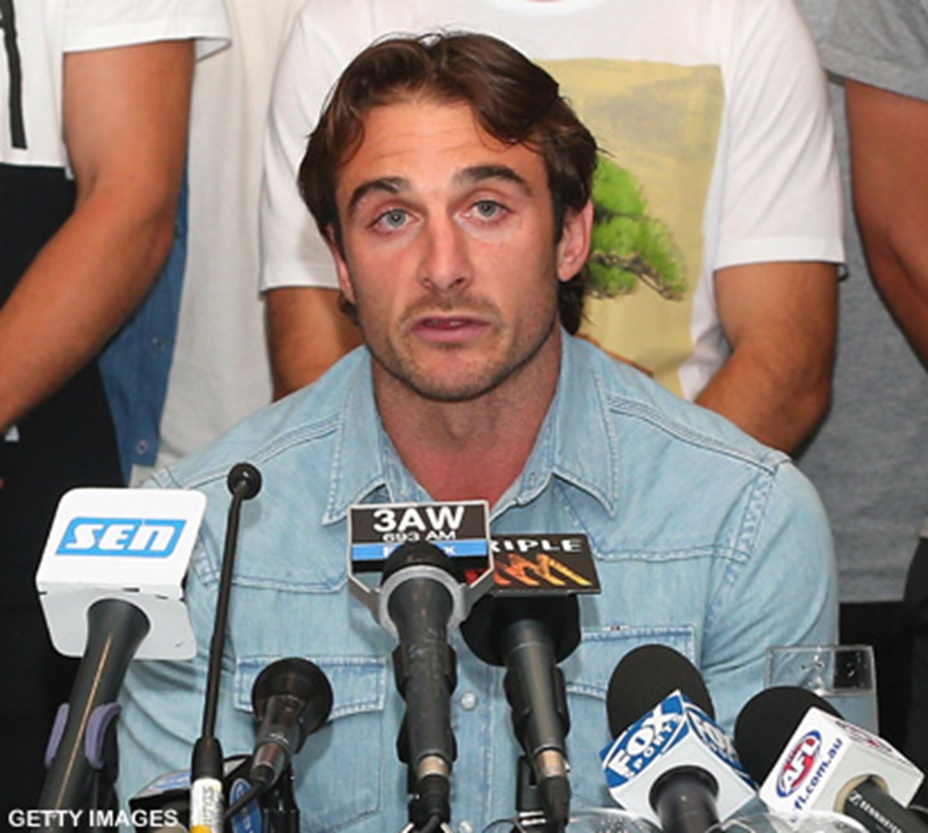The Australian Football League Anti-Doping Tribunal "found 34 current and former Essendon players not guilty of using a banned supplement during the 2012 football season," according to Stephanie Chalkley-Rhoden of the ABC. It means that "they are clear to play in the AFL's opening round this weekend." AFL Anti-Doping Tribunal Chair David Jones said that "the panel was not satisfied the players violated the AFL's doping code." He said, "The tribunal was comfortably satisfied that the substance thymosin beta-4 was at the relevant time a prohibited substance under the [anti-doping] code. The tribunal was not comfortably satisfied that any player violated clause 11.2 of the AFL Anti-Doping Code." He said the decision against "a former Essendon support person," believed to be Stephen Dank, who ran the club's supplements program during the time in question, would be made at a later date (ABC, 3/31).
ESSENDON RELIEF: NEWS LIMITED's Walsh & Denham reported as Essendon players were absolved of doping charges, "it felt as though they had won a premiership." According to Essendon captain Jobe Watson, who has been the players’ face throughout the supplements scandal, "it took a couple of seconds for the result to sink in." Before heading to Toorak’s Botanical Hotel to celebrate with the team, Watson said, "We feel today’s decision handed down by the AFL tribunal fully supports the players’ belief that they are innocent. We want to go to bed at night and not have it the last thing we think of and the first thing we think of when we wake up" (NEWS LIMITED, 4/1). In Sydney, Towers & Ferguson wrote Australian Sports Anti-Doping Authority Head Ben McDevitt lashed out at Essendon, condemning its 2012 injection program as "absolutely and utterly disgraceful" and refusing to rule out appealing the AFL Anti-Doping Tribunal's not guilty verdict. McDevitt's attack failed to shift the focus "from the now infamous press conference" two years ago when then Labor government ministers and sports chiefs united in what was dubbed the "blackest day" in Australian sport. Despite the tribunal finding on Tuesday that 34 past and present players were not guilty of taking a banned substance, McDevitt "refused to back down" in his attack on Essendon, blasting the club over its "injection regime" and saying that "it had let down its players." As the national anti-doping body "reels from the AFL finding, embarrassment is filtering down from the top echelons of Australian sporting codes and politics, particularly among those who took a hardline approach to the report at the time." Former Sports Minister Kate Lundy, who warned dopers that "they would be caught," did not comment on Tuesday and neither did former Justice Minister Jason Clare, who said the revelations of the ACC report would "disgust Australian sports fans" (THE AUSTRALIAN, 4/1).
STAGE-MANAGED: In Sydney, Chip Le Grand wrote an "unrepentant" Dank "foreshadowed further legal action." Dank "accused ASADA for blundering its investigation" and the AFL for "stage managing" the process since it was first announced in Feb. '13. While other key figures in the controversy said that they are keen to move on, "Dank remains furious." Dank: "I’ve understood from the very early days how this thing was stage-managed. I think we know the script was written from day one ... by the Australian Football League" (THE AUSTRALIAN, 3/31). In Melbourne, Grant Baker reported AFL CEO Gillon McLachlan said Tuesday he hoped ASADA would not appeal the historic tribunal decision that cleared the “Essendon 34” of doping charges. McLachlan -- who called on players to publicly release the 133-page judgment -- said that he hoped Tuesday’s unanimous decision "was the full stop on a 26-month saga." McLachlan said, "It is a decision for ASADA -- my personal view is no (they should not appeal)." McLachlan said that "the league was committed to being as transparent as it could in the final throes of the doping scandal, and said it would shortly release an internal review into its own handling of the affair" (HERALD SUN, 4/1). Also in Melbourne, Caroline Wilson wrote now that players have been cleared of doping charges, the lawyer who represented 24 assistant coaches, trainers and staffers has described his clients as the true "collateral damage" of the club's dangerous '12 drugs program. Chris Pollard "accused the club of discarding staff with lower profiles while bigger football names survived." Pollard: "This is another case of where people in this industry with lower profiles are treated differently. There were a number of people the club just didn't want around anymore and they were just discarded." Pollard said that "he remained concerned about the welfare of the 24 Essendon staff he represented." Pollard: "The nature of the [ASADA/AFL] interviews was that they were like police interviews and a lot of the accusations being put to these people were most unfair" (THE AGE, 3/31).
SHARKS SHOCKED: In Sydney, Brad Walter wrote frustrated National Rugby League side Cronulla players "are questioning" why they did not receive the same support and advice from the Sharks to fight doping allegations as Essendon. Cronulla and Essendon "were the focus of a two-year investigation" by ASADA. While criticism has been leveled at the "leniency of what was effectively a three-match suspension" for the majority of the Cronulla players, "they feel let down by the Sharks and the NRL after the verdict of the AFL tribunal." One player agent said, "If they were better resourced and had greater support they would have fought like the Essendon players did. But they were advised to take a deal that was effectively too good to refuse and told that they would be on their own if they didn't. Cronulla didn't back the players like Essendon did and that is disappointing for those players after what has now happened in the AFL" (SYDNEY MORNING HERALD, 3/31).




